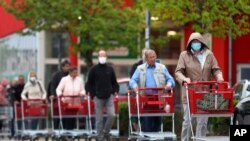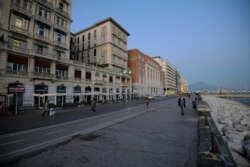Several countries are gingerly taking steps to relax lockdown orders imposed to control the spread of the novel coronavirus.
German authorities let some small stores reopen their doors Monday, while still enforcing social distancing rules.
Hundreds of small businesses in Albania were allowed to open Monday for the first time in a month. Fishing boats and food processors will also be able to resume operations.
Sri Lanka lifted curfews in two-thirds of the country, with plans for the rest to relax lockdown orders in Wednesday.
Students in Norway returned to school Monday, while those in Denmark are set to go back Wednesday.
World Health Organization chief Tedros Adhanom Ghebreyesus said he was “encouraged” by countries planning how to ease social restrictions, but he cautioned it is “critical that these measures are a phased process.”
New Zealand announced Monday its plans to start emerging from a one-month lockdown beginning April 27 with such a phased approach. Prime Minister Jacinda Ardern said some restrictions will be eased for a two-week period at which time her government will evaluate the situation and decide whether to allow more activities.
Officials in South Korea also urged a cautious approach after lifting some lockdown measures as the number of new cases there continued to show sustained decline.
“We must not let down our guard until the last confirmed patient is recovered,” President Moon Jae-in said.
A British government minister said pubs and restaurants will stay closed after the country starts easing its nationwide lockdown on May 7.
Zimbabwe’s president Emmerson Mnangagwa says mines and factories can reopen, but he has extended his country’s lockdown that was supposed to end Sunday another two weeks.
Businesses and schools in most of the United States remain shuttered, sparking some demonstrations against governors and their orders for people to stay in their homes and avoid social contact as much as possible.
The small groups of mostly pro-Trump demonstrators have turned out in several state capitals, complaining that the closures are violating their constitutional rights.
President Trump said a coronavirus briefing Sunday that some governors have gotten “carried away” with their restrictions and that people have the right to protest. But he said none of it really matters in the end because he said states will start to reopen.
Some governors say their states are far from ready to reopen.
“We’re sending completely conflicting messages out to the governors and to the people, as if we should ignore federal policy and federal recommendations,” Maryland’s Republican Governor Larry Hogan said on CNN’s “State of the Union” Sunday.
Democrat Jay Inslee of Washington says Trump’s message that states reopen is “dangerous.”
Also Sunday, White House coronavirus task force member Seema Verma said U.S. nursing homes are now required to report if there are any COVID-19 cases in the facility to patients and their families and to report any such cases directly to federal health authorities.
The elderly are especially vulnerable to the coronavirus and some nursing homes, not just in the U.S. but in other countries, have come under criticism for an alleged lack of transparency.







